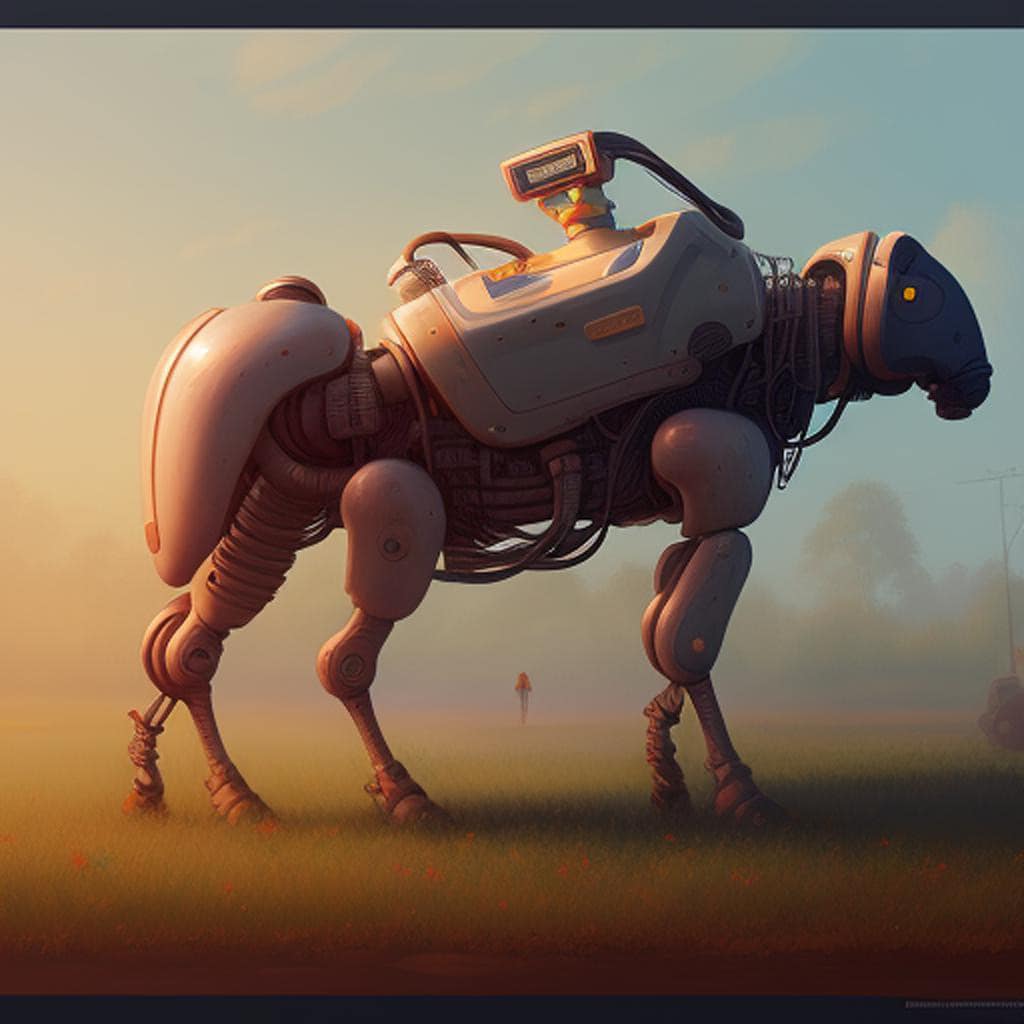Ethical Implications of AI in Food and Agriculture
As AI continues to revolutionize the food and agriculture industries, it is important to consider the ethical implications of its use. From labor displacement to data privacy concerns, AI presents a number of ethical challenges that must be addressed in order to ensure a fair and sustainable future for all.
One of the main ethical challenges of AI in food and agriculture is the potential for labor displacement. As AI systems become more advanced, they have the potential to replace human workers in certain tasks, such as harvesting and processing crops. This can lead to job losses and economic inequality, particularly in rural areas where agriculture is a major source of employment.
Another ethical concern is the potential for data privacy violations. AI systems rely on vast amounts of data to function, including data on crops, weather patterns, and consumer behavior. This data can be sensitive and personal, raising concerns about who has access to it and how it is used.
Additionally, there are concerns about the potential for AI to perpetuate existing biases and inequalities in the food and agriculture industries. For example, if AI systems are trained on data that reflects existing inequalities, they may perpetuate those inequalities in their recommendations and decisions.
Despite these ethical challenges, there are also opportunities for AI to promote ethical and sustainable practices in food and agriculture. For example, AI can be used to optimize crop yields and reduce waste, leading to more efficient and sustainable production practices. It can also be used to monitor and improve worker safety and working conditions, promoting fair and ethical labor practices.
While AI has the potential to revolutionize the food and agriculture industries, it is important to consider the ethical implications of its use. By addressing concerns around labor displacement, data privacy, and biases, we can harness the power of AI to promote a more ethical and sustainable future for all.
Table summarizing the ethical implications of AI in food and agriculture
| Ethical Concern | Description |
| Labor Displacement | As AI systems become more advanced, they have the potential to replace human workers in certain tasks, leading to job losses and economic inequality. |
| Data Privacy | AI systems rely on vast amounts of data, raising concerns about who has access to it and how it is used. |
| Bias and Inequality | There are concerns about the potential for AI to perpetuate existing biases and inequalities in the food and agriculture industries, if the AI systems are trained on data that reflects existing inequalities. |
| Opportunity for Sustainability | AI can be used to optimize crop yields, reduce waste, and monitor and improve worker safety and working conditions, promoting fair and ethical labor practices and sustainable production practices. |
While there are ethical challenges to using AI in food and agriculture, such as labor displacement and data privacy concerns, there are also opportunities for AI to promote ethical and sustainable practices in these industries. By addressing these concerns and leveraging the power of AI for sustainability, we can work towards a more ethical and sustainable future.
Actual solutions and answers
It is important to address these ethical concerns and develop solutions to promote a fair and sustainable use of AI in food and agriculture. Here are some examples of potential solutions:
Labor Displacement
One potential solution to address the potential for labor displacement is to retrain workers for new roles that are in high demand in the industry, such as data analysis or machine maintenance. Another solution is to develop AI systems that work in conjunction with human workers, rather than replacing them entirely.
Data Privacy
To address concerns around data privacy, it is important to develop clear guidelines and regulations around the collection, use, and sharing of data in AI systems. This can include measures such as data anonymization and transparency around data usage.
Bias and Inequality
To address concerns around bias and inequality, it is important to ensure that AI systems are trained on diverse and representative data sets. This can help prevent the perpetuation of existing biases and inequalities in the food and agriculture industries. Additionally, it is important to regularly evaluate and audit AI systems for potential biases.
Opportunity for Sustainability
To maximize the potential of AI for sustainability, it is important to prioritize the development and implementation of AI systems that promote sustainable practices in food and agriculture. This can include optimizing crop yields and reducing waste, as well as monitoring and improving worker safety and working conditions.
These are just a few potential solutions to the ethical concerns surrounding AI in food and agriculture. By addressing these concerns and promoting a fair and sustainable use of AI in these industries, we can work towards a more equitable and sustainable future.

Brands and organizations working on solutions to address the ethical concerns surrounding AI in food and agriculture.
Many brands and organizations are working on developing solutions to address the ethical concerns surrounding AI in food and agriculture. Here are some examples:
- Labor Displacement:
John Deere, a leading manufacturer of agricultural equipment, has developed an AI-powered combine harvester that works in conjunction with a human driver. The harvester uses AI algorithms to optimize crop yields and reduce waste, while the human driver is still responsible for controlling the machine and making key decisions.
FarmWise, a robotics company, has developed an AI-powered robot that can weed fields autonomously. The company has partnered with farmers to test the robot in the field and has emphasized that the robot is designed to work alongside human workers, rather than replace them. - Data Privacy:
The Open Agriculture Initiative, a research group at MIT, is working on developing an open-source platform for AI-powered agriculture that prioritizes data privacy and transparency. The platform is designed to give farmers control over their own data, while still allowing for the development of AI algorithms that can help optimize crop yields and reduce waste.
IBM has developed an AI-powered platform called Watson Decision Platform for Agriculture, which uses weather and soil data to provide personalized recommendations for farmers. The platform is designed to protect farmers’ data privacy by giving them control over their own data and allowing them to choose whether to share it with others. - Bias and Inequality:
The World Food Program (WFP) has developed an AI-powered tool called the HungerMap LIVE, which uses satellite imagery and AI algorithms to identify areas of the world where food insecurity is high. The tool is designed to help the WFP prioritize its efforts and allocate resources to areas that need them most, while also addressing concerns around bias and inequality.
The AI for Good Foundation is a non-profit organization that is working on developing AI-powered solutions to address a range of social and environmental challenges, including food insecurity. The organization emphasizes the importance of building diverse and inclusive teams to ensure that AI solutions are developed in a way that is fair and equitable. - Opportunity for Sustainability:
Nestle, the world’s largest food and beverage company, has set a goal of achieving net-zero greenhouse gas emissions by 2050. To achieve this goal, the company is using AI-powered optimization tools to reduce waste and improve energy efficiency in its operations, as well as investing in sustainable agriculture practices.
The Good Food Institute is a non-profit organization that is working on promoting plant-based and cell-based alternatives to meat and dairy products. The organization emphasizes the potential of these alternatives to promote sustainability and reduce the environmental impact of the food industry.
These examples show how brands and organizations are working on ethical solutions for AI in food and agriculture, with a focus on promoting sustainability, protecting data privacy, and addressing issues of bias and inequality. By continuing to prioritize ethical considerations in the development and implementation of AI systems, we can work towards a more sustainable and equitable food system.
Table summarizing the brands and organizations working on ethical solutions for AI in food and agriculture
| Ethical Concern | Example Brand/Organization | Description |
| Labor Displacement | John Deere | Developed an AI-powered combine harvester that works in conjunction with a human driver. |
| Labor Displacement | FarmWise | Developed an AI-powered robot that can weed fields autonomously. |
| Data Privacy | The Open Agriculture Initiative | Working on developing an open-source platform for AI-powered agriculture that prioritizes data privacy and transparency. |
| Data Privacy | IBM | Developed an AI-powered platform called Watson Decision Platform for Agriculture, which protects farmers’ data privacy by giving them control over their own data. |
| Bias and Inequality | The World Food Program | Developed an AI-powered tool called the HungerMap LIVE, which uses satellite imagery and AI algorithms to identify areas of the world where food insecurity is high. |
| Bias and Inequality | AI for Good Foundation | Working on developing AI-powered solutions to address social and environmental challenges, including food insecurity, with a focus on building diverse and inclusive teams. |
| Opportunity for Sustainability | Nestle | Using AI-powered optimization tools to reduce waste and improve energy efficiency in its operations, as well as investing in sustainable agriculture practices. |
| Opportunity for Sustainability | The Good Food Institute | Working on promoting plant-based and cell-based alternatives to meat and dairy products to reduce the environmental impact of the food industry. |
These examples show how brands and organizations are working on ethical solutions for AI in food and agriculture, with a focus on addressing concerns around labor displacement, data privacy, bias and inequality, and promoting sustainability.

Thank you for questions, shares and comments!
Share your thoughts or questions in the comments below!
Source OpenAI’s GPT language models, Fleeky, MIB, & Picsart






